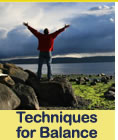    
Balancing Act: The Newsletter (No. 149, January 2011) Follow me on Twitter! You can find me here: And find me on Facebook:  Techniques for balance From the first Balancing Act, September, 1999 (!!!): One of the worst mistakes I've ever made was to "compartmentalize" my life. It dawned on me a few years ago that I don't have a "personal life" and a "business life," but simply A LIFE. Consequently, I do things when they feel right, which might include writing an article or taking care of client work on a Saturday morning, and sitting at the pool on a Tuesday afternoon. Time is the great equalizer, since we all have the same amount of it available. When we say that we don't have the time to help a spouse, watch our children perform, fix things around the house, or improve ourselves, we really mean that we don't consider it a priority. We actually do have the time. When you receive reading material that you may or may not want to review, place it in an obvious pile where you'll see it every day. Whatever you haven't read after two weeks, simply throw out. It's not urgent and you don't need it. People often make the mistake of allotting time for various aspects of their life each week, thinking that the technique provides balance (e.g., two hours a day with the pets, an hour every other day exercising, a weekend day with a significant other). But this meting out of hours only provides quantity, not quality. The real test is in the intensity, fulfillment, and enjoyment of the time, not the mere expenditure of it. Most anger is actually self-directed anger that is transferred to others in order to achieve self-preservation. If you're angry a lot of the time, don't assume you've met a rash of incompetent people on the phone, at work, among customers, and in social settings. Find out why you're really angry with yourself. A certain amount of stress—eustress—is healthy because it keeps the adrenaline flowing and provides for a sense of urgency. We've all heard others (and/or ourselves) say, "I work best under pressure and approaching deadlines." Don't try to eliminate stress, but do try to manage it so that it creates energy but stops short of anxiety and paralysis. Most people I've worked with place an inordinate emphasis on correcting weakness and do very little about building on strength. No one excels by correcting weaknesses (which simply serves to maintain the status quo a little more easily). Find out what your real strengths are (many people are totally unaware of some of them) and make plans to exploit them in work and at play. Always have a book and a pad and pen next to your bed, even when traveling. If you can't sleep, read the book. If you suddenly have a bright idea, write it down. I find that many people lose their best ideas because they don't capture them quickly after thinking of them. Balance in life and work is not about equal distribution. It is about variety, diversity, and establishing the correct priorities for yourself. I don't care if I never manage people again, because it's an activity that I loathed. But I get skittish if I don't have a book to read at any given moment when I have the urge to do so. The "success trap" occurs when you are rewarded and lauded for something that you're good at but actually dislike. This is how jobs get in the way of careers, and necessary evils come to impede our lives. Let your internal gyroscope tell you what's right for you, not external influences. 
Every new year brings with it a closer horizon. The cerulean sky and azure sea meet with more of a definition and less of a blend. I recall in Bora Bora being able to actually see the varied colors of the ocean meet in defined lines. Life is like the South Pacific’s gorgeous waters.
So, too, your life becomes more defined with each passing year. The playwright Tom Stoppard observed once that “Age is such a high price to pay for maturity.” Yet life grows richer as you get older. The heights afford greater perspective and the lows aren’t quite so threatening or elongated. We might never climb Kilimanjaro, but we’ve climbed to other, more dramatic heights in our lives. To me, the new year (and the passage of time it represents) means that we can more closely examine what’s important to us. We become more involved in Pinteresque moments, taking the time to understand and to question. Sometimes there are no answers, but merely recognizing the question is fulfilling. Life on this planet is a journey, not a destination. Symbolism is important (else, we wouldn’t need it), and the symbolic “gong” of the changing of the guard of time every January 1 is an excellent opportunity to take a breath, open your eyes, listen to what’s around you, and sniff the wind. There exists the opportunity for reinvention and refocus, not in mere resolutions discarded like used play tickets in the morning, but in sincerely changing aspects of your life. To leave the starting blocks and race into the new year no different from the way you crossed the finish line in the last one is, to me, a boring pursuit. (And having been a sprinter in my track days, I can attest that we lose a step with each passing year.) Perhaps we should change the distance. Or look for a short cut. Or not run a race at all. My message is that, once the revelry is over, don’t worry about vacant resolutions that are well meaning but unsupported, intellectual but not emotional. Find instead those changes that will bring new meaning to that closer horizon and your trip toward it. I’m looking as the titivated Christmas tree still standing, beautiful still, but in its last days. Don’t go into the new year all dressed up but with nowhere to go. The inexorable horizon awaits. Make the best of the distance that remains.  The human condition: Demonization I love a good argument, and often suggest something I don’t actually believe to see how well I can roil things and defend the position. I believe that intelligent and valuable people can have opposing points of view. It’s fair to debate the view, but sick to demonize the opposition. Once we create labels we create emotional “shields” which prevent all rational communication thereafter. I might disagree with your choice of a movie, but that doesn’t make you (or me) a troglodyte, ignorant, or bereft of decency. It simply means that you saw more humor than I could possibly unearth in, say, “Bridesmaids.” The media—including the social media platforms—have abetted this tendency to condemn an individual’s personal existence, or a group, or a country, or an ethnicity. We are certainly all, by any objective criteria, more similar than dissimilar, with the exception of what chugs along the synapses inside our heads. I can dislike an opposing politician’s point of view without hating the person. I can disagree with a movement without demanding the expulsion of every member from the community. When you listen today to anything from a school board hearing on whether athletes with an “F” grade in a class should be allowed to play, to a Facebook or YouTube exchange generating obscenity and hate over opposing views of a singer, you come to realize that we often instantly escalate a difference of opinion to a fight to the finish. Jefferson noted once that, in matters of taste, swim with the tide, but in matters of principle, stand like a rock. We seem to be throwing rocks—and worse—at every difference in taste, orientation, and perspective. People are beaten at sporting events for rooting for the other team. Coaches are attacked by parents because their kid doesn’t get enough playing time. When I was chair of the town planning board, I once faced an irate citizen who demanded that an American flag be positioned at a certain point in the room and that the meetings begin with the Pledge of Allegiance. “Why?” I asked. “Because we must show our patriotism at every opportunity!” he asserted. “Well, I believe that patriotism is manifest in more important ways than the arbitrary reciting of certain words in certain settings,” I told him (just as I believe that true religion is based on a lot more than appearing at a set time in a certain building). The man stormed away, mumbling about my abilities. When we demonize others we become demons ourselves. In virtually every belief system, a demon is non-human and malevolent. That’s not the picture I want people to remember. UPCOMING EVENTS
THOUGHT LEADERSHIP WORKSHOP 2012

SELF-ESTEEM PRACTICUM

SPEAKING WITH ALAN

|
Copyright 2011 Alan Weiss. All rights reserved.

Balancing Act® is our registered trademark. You are encouraged to share the contents with others with appropriate attribution. Please use the ® whenever the phrase "Balancing Act" is used in connection with this newsletter or our workshops. Join the Friday Wrap�
Weekly, 15-minute podcasts with segments on current business events, new intellectual property, and some humor. Monthly, ten-minute videos on business and self-development. And a full-day, free conference in mid-year. Three full work days—24 hours—of programming for a few dollars an hour in investment. Get this weekly booster shot right away. You’ll get all the archived material. 2012 Teleconference Series
Next year there is a learning guide before each teleconference, and a free download, as always. Join us for �Conversation Domination� and �The Mental Gym,� as well at 8 other sessions of advanced skills building. Shameless PromotionEast Greenwich, RI
|
| Having problems viewing this email, click
here. |
|
P.O. Box 1009 � East Greenwich, RI 02818-0964 � Telephone: (401) 884-2778 � Fax: (401) 884-5068
All Rights Reserved. Copyright 2025 Summit Consulting Group
ISSN 1934-3116









